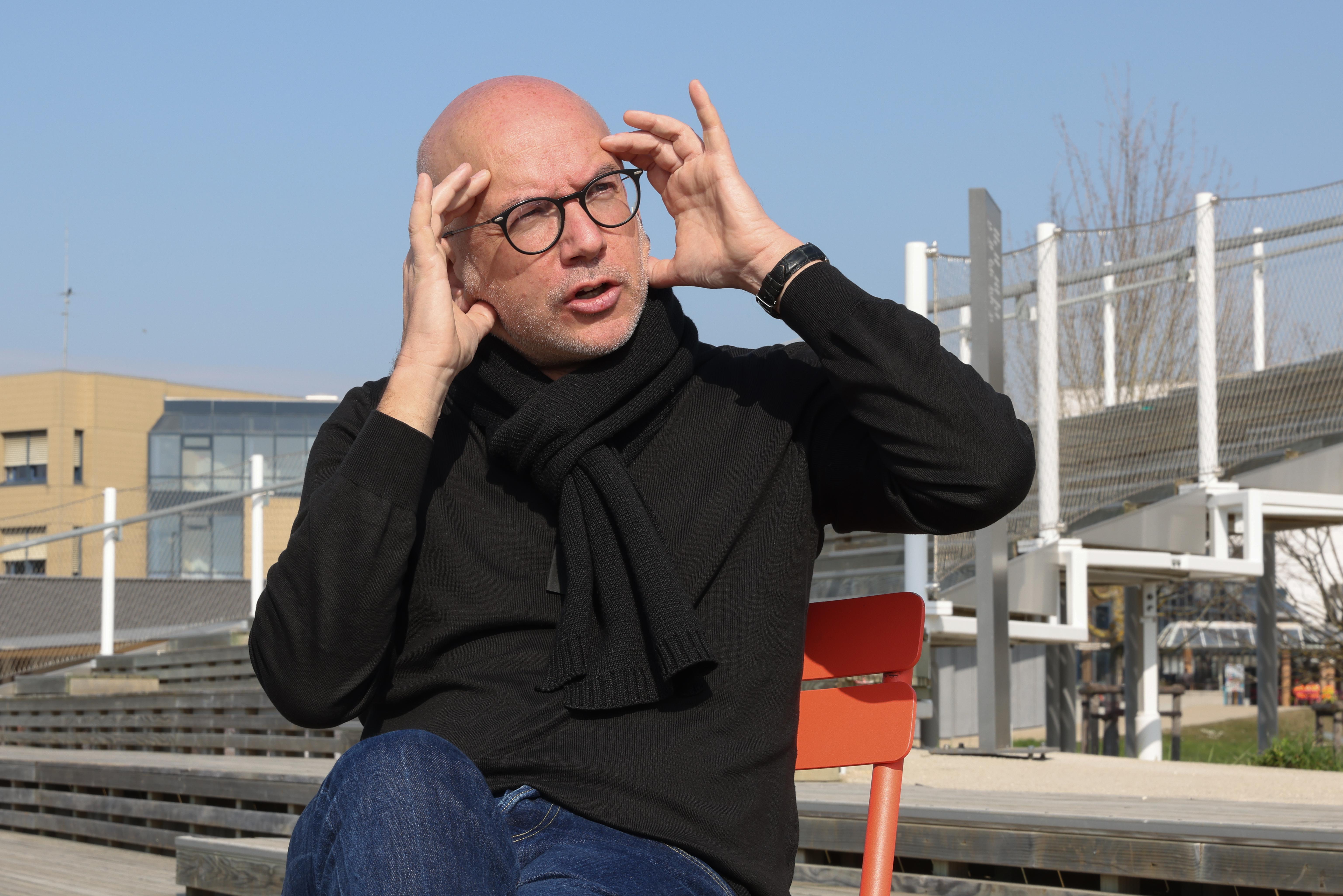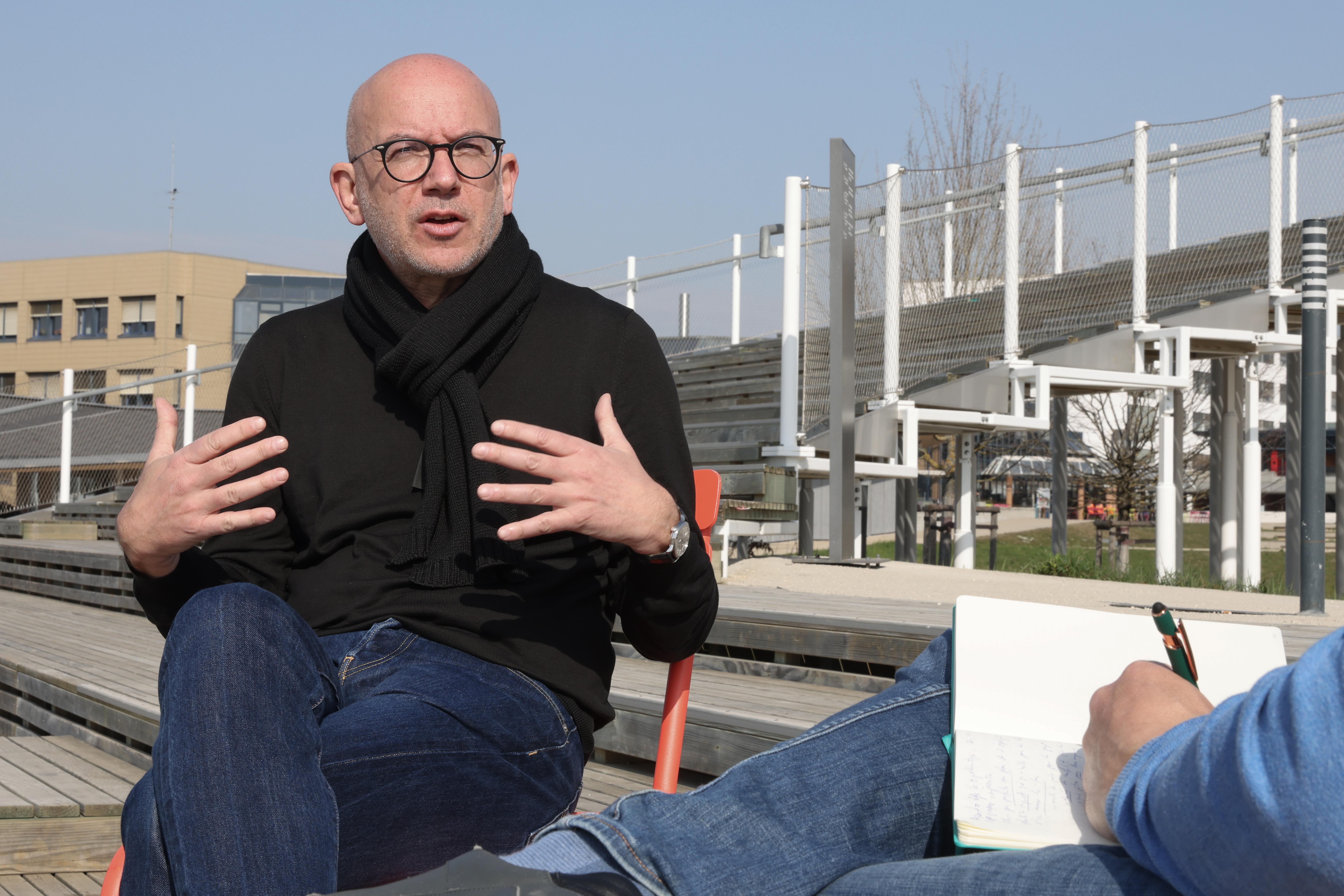
Yves Daccord en interview à l'EPFL le 21 mars 2022. © EPFL / Murielle Gerber
Yves Daccord, who served as the director-general of the International Committee of the Red Cross (ICRC) from 2010 to 2020, has just joined EPFL's EssentialTech Centre as a senior advisor. In this interview, he explains how he will draw on his knowledge and contacts to help the Centre set ambitious objectives as it enters its second decade.
Before we discuss your decision to join EPFL, could you share your thoughts on the war in Ukraine?
Of course. The Russia-Ukraine conflict concerns us all. It's worth noting that it affects us collectively - across nations and generations. Among older people, that's no doubt because it stirs up images from long ago, it brings to mind episodes from the past that some of us have only seen in news reports or movies. What strikes me is that today's youth are paying such close attention to the conflict: maybe that's because what they're seeing is not so different from some of the video games that they play.
What do you think is the main thing people are feeling with regard to this war?
Fear, quite obviously. And not just in Ukraine - some people in Germany, for example, have moved because they're afraid of getting caught up in the fighting. This fear is very interesting. I believe it could fundamentally change Europe, especially in the wake of Covid. The West now realizes it has taken some things for granted, and that it can find itself quickly overwhelmed. Events today are no longer comprehensible or predictable - even what was unthinkable has become possible.
Why has Europe come together in such a spirit of solidarity, so much more so than in response to any other conflict?
I see several factors at play. There's Europe's geographical proximity to Ukraine, of course. And the fact that we're each affected in some way, if only when we fill up the gas tank. I think the cultural affinity between Europeans and Ukrainians also plays a role: it's sad to say, but things wouldn't be the same if we didn't have the same religion or democratic values. There's also the fact that, in this conflict, Putin is the epitome of the bad guy, the "historical enemy" in all those security scenarios developed during the Cold War, including here in Switzerland. Lastly, the extremely sudden and brutal dimension of this invasion has elicited a simultaneous - and self-reinforcing - outpouring of solidarity. It's similar to what we see in the wake of a natural disaster.

What are the main challenges facing Ukrainians today?
They are under tremendous pressure. Over ten million people have already been uprooted - that's more than a quarter of the population! Yet two-thirds of these displaced people are still in Ukraine. And they cannot count on support from their health-care system, which has been battered by military strikes. This is indeed part of a proven strategy: hospitals are the first to be destroyed so as to sow terror among the people. Very soon there will be interruptions in the water supply and in water treatment, which will lead to health problems. I'm also worried about young people who, on top of this deeply traumatic experience, may not be able to resume their studies for years. In the longer term, I fear the ramifications of widespread and deep-seated anti-Russian feelings - and not just in Ukraine.
What about the Russian people?
That's also a concern. The international sanctions, although necessary and justified, will unfortunately place a heavy burden on the poorest parts of society, and these people will suffer the consequences for a long time to come.
This new iron curtain wouldn't be the same as what we saw in the 20th century: it would reach into the virtual realm as well. That's troubling.
What can we hope for at this point?
The key will be to keep the diplomatic dialogue going while maintaining a high level of pressure on Russia. Intelligent diplomacy, if it comes up with solutions that both sides can accept, could ease the conflict. Negotiating such solutions is always the hardest part. What Putin has proposed so far is a non-starter. But we mustn't forget that Ukraine hasn't been perfect either. My concern is that the two sides won't make the concessions necessary to achieve anything more than a simple cessation of hostilities, and this would lead to years of hardship for ordinary citizens and a growing chasm between Russia and the West. This new iron curtain wouldn't be the same as what we saw in the 20th century: it would reach into the virtual realm as well. That's troubling.

Is this where the "digital humanitarian" approach comes in?
Yes, and it's highly relevant to modern-day conflicts. When you're in a country at war, secure facilities to store personal and sensitive data are hard to come by. Geolocalization data and contact lists can become extremely dangerous spoils of war. The ICRC, among others, has been involved in this issue for years, and it's working with EPFL to find solutions such as secure data-storage and communications systems.
Is that what you'll focus on at the EssentialTech Centre?
Not just that. Of course, I'll be contributing my experience in humanitarian work, and I'm still in touch with field staff. This will help the Centre develop technology with the best chances of working in a fast-changing environment. But I'm also here because EssentialTech has reached a key milestone: it's celebrating its tenth anniversary this year, after having achieved so much already. So one of my goals will be to work on a roadmap for the next ten years. The idea will be to come up with new projects and expand the areas in which the Centre is active. We will also use this anniversary to consolidate our relationship with our longstanding partners and bring in new ones.
Enabling victims to live an active life is absolutely crucial for achieving durable peace.
In what fields do you think EPFL can really make a difference?
There are several. EPFL and the ICRC have already done some great work together - one example is how we developed prostheses specifically for mine victims. We tend to forget, once a conflict is no longer the focus of our attention, that enabling victims to live an active life is absolutely crucial for achieving durable peace. EPFL could also make a real contribution in the area of data protection in war, which I already mentioned. In general, EPFL's know-how could be a real boon for many aspects of PeaceTech.
Why did you decide to join EssentialTech?
I think the Centre's approach really makes sense. It's unlike the slightly paternalistic approach that we often see in the humanitarian and development sphere. The Centre comes up with made-to-measure solutions hand in hand with those who need assistance. It takes a very broad and multidisciplinary approach that brings everyone in the value chain together very quickly. This ensures that the solutions not only improve things on the ground from the start but have a lasting impact, too. Seeing that, people will realize that these solutions can work elsewhere - on a global scale.
How do you envision the EssentialTech Centre in ten years?






